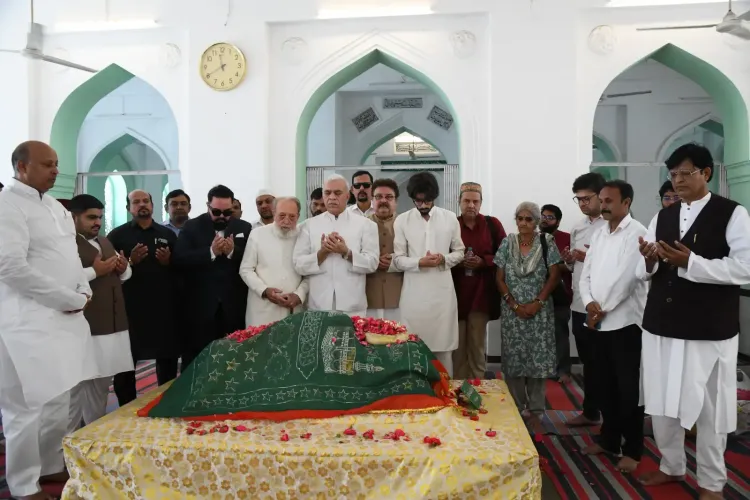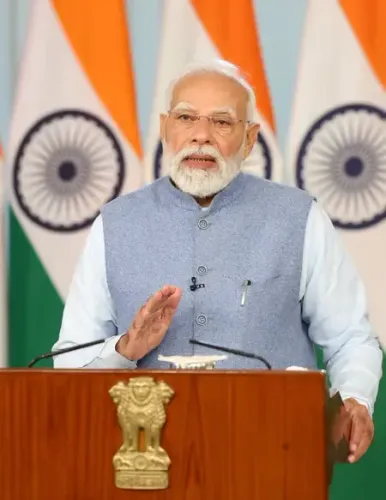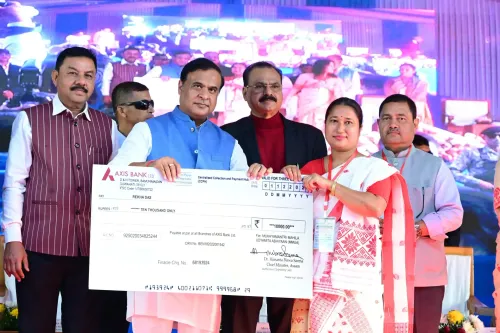Honoring the Seventh Nizam on His Birth Anniversary

Synopsis
Key Takeaways
- Tributes to Nizam VII emphasize his humanitarian contributions.
- Calls for Telangana government recognition of his legacy.
- Nizam's transformative impact on education and healthcare.
- Advocacy for preservation of historical sites from his era.
- Nizam's leadership and contributions recognized posthumously.
Hyderabad, April 6 (NationPress) Profound honors were bestowed upon the seventh Nizam Mir Osman Ali Khan as he marked his 139th birth anniversary on Sunday.
Members of the Nizam’s family, historians, heritage lovers, and citizens from diverse backgrounds gathered to offer floral tributes at his resting place near Judi Masjid in King Kothi Palace.
Nawab Mir Najaf Ali Khan, the Nizam’s grandson, and historian P. Anuradha Reddy were notably present to pay their respects.
They reflected on the Nizam’s significant contributions to society, governance, and humanitarian efforts, asserting that despite some attempts to misrepresent his legacy, history remains steadfast.
The group advocated for the Telangana government to officially recognize the Nizam’s birth anniversary, emphasizing the need for a school curriculum inclusion about his contributions and the preservation of historical sites from his era, with an immediate focus on repairing Osmania General Hospital.
The Nizam was described as a visionary and compassionate leader who ruled for 37 years, from 1911 to 1948, during which he transformed Hyderabad into a modern state. His tenure was characterized by progressive policies, secular values, and a commitment to the welfare of all citizens, regardless of caste or religion.
He prioritized education, healthcare, and urban development, laying essential groundwork for the city’s modernization. His secular approach promoted communal harmony, and his patronage extended to scholars, institutions, and places of worship across various faiths.
The Nizam played a crucial role in revolutionizing healthcare, founding world-class medical institutions like Osmania General Hospital, Unani Hospital, Fever Hospital, Nizam’s Institute of Medical Sciences (NIMS), and Niloufer Hospital.
His urban development initiatives led to modern town planning and sanitation systems. His reign also saw advancements in communication technologies, including telephone services and postal systems.
The Nizam provided financial support to educational and religious institutions for Hindus, Muslims, Christians, and Sikhs without bias. He financed the compilation and publication of the Mahabharata and donated generously to institutions like Banaras Hindu University and Shantiniketan.
In recognition of his leadership, the Indian Government appointed the Nizam VII as Rajpramukh (Governor) in 1948, a role he held until 1956 when he opted to resign voluntarily.
He also donated five tons of gold to India’s National Defence Fund at the request of Prime Minister Lal Bahadur Shastri.
“He was a compassionate ruler who lived simply yet worked diligently to create a modern, inclusive city. The impact of Nizam VII’s contributions is evident throughout Hyderabad. It is profoundly disappointing that successive governments have not appropriately acknowledged his legacy,” remarked Najaf Ali Khan.
To commemorate the Nizam’s birth anniversary, the Deccan Archive and Indian National Trust for Art and Cultural Heritage (INTACH) in Hyderabad organized a heritage walk around the King Kothi area to honor his legacy and explore the rich cultural and architectural heritage of the region.










